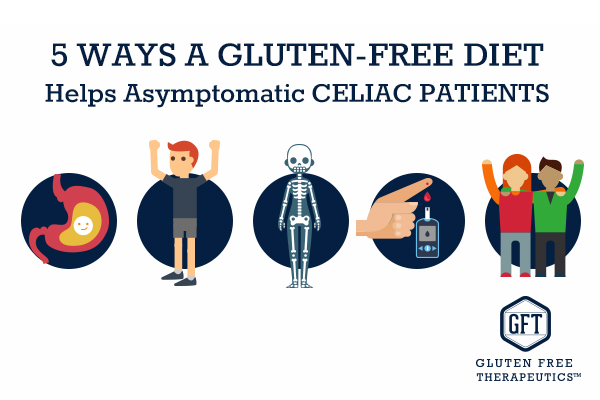
If You are a Celiac Patient that has No Symptoms…Should you follow a GF Diet Anyway?
For patients enduring years of gastrointestinal problems, a gluten-free diet often represents a welcome change in their dietary habits. However, for those that find out they have celiac disease through a screening and don’t have any major symptoms, eliminating gluten from their plates may seem unnecessary and over the top.
If this is your case, it may be tempting to question the long-term benefits of such a restrictive diet. It is hard to stay motivated to make such a commitment to the diet change when you are not experiencing the “got glutened” effects that most celiac patients do.
So here we present 5 reasons why you should still eradicate gluten from your life:
1. Improve symptoms (you didn’t realize you had!)
When there is no specific pattern, it’s easy to ignore mild and rare symptoms and take them as part of normal life. After all, how many times have you attributed occasional episodes of abdominal pain or diarrhea to food that was bad or a stressful situation and quickly forgot about them? For many of these so-called asymptomatic patients, it’s only when they embark on a gluten-free diet – with the subsequent improvement of their symptoms – that these patients recognize they weren’t completely free of symptoms after all!
2. Eliminate nutritional deficiencies
Even more important than mild gastrointestinal problems, it’s possible that you may have developed silent underlying conditions which can cause severe problems in the future. Nutritional deficiencies are a case in point. For example, blood iron levels may be within normal range, but asymptomatic patients are more likely to develop a subclinical iron deficiency, which a gluten-free diet and adequate iron supplementation can resolve.
3. Recover bone mineral density
Another silent complication associated with celiac disease involves a higher risk of fractures and a myriad of other bone conditions. It’s important to emphasise that just because you don’t seem to have major intestinal upsets, this does not give you immunity over bone problems. This is another example of how a gluten-free diet may be able to help you before any damage becomes irreversible: studies have shown that even in asymptomatic patients the process of bone loss and demineralisation can be stopped or at least slowed down by dietary treatment. Curiously, the authors also detected a drop in calcium levels after starting a gluten free diet. This was attributed to effective bone restoration, and highlights the need for adequate vitamin and mineral supplementation.
4. Easier to control type 1 diabetes
If you also have type 1 diabetes, you may struggle to keep this condition under control. In this case, the burden of multiple conditions may easily force the new gluten-free diet down to the bottom of your agenda, especially if there are no major symptoms. Possibly for this reason, studies have shown that the incidence of asymptomatic patients seems particularly high among celiac patients that suffer from diabetes. It may be time, however, to rekindle your interest in the new diet. It turns out patients following a strict gluten free diet are able to manage better their diabetes, with improved glycemic control and renal protein excretion.
5. Improve quality of life
Finally, despite the difficulties of starting a new way of eating, most asymptomatic patients report a higher quality of life following diagnosis and a willingness to continue with the diet. At the very least, starting a gluten-free diet doesn’t affect perceived happiness and quality of life. However, there are some exceptions to this rule: it’s possible that for some patients, a diagnosis of celiac disease may increase anxiety and health concerns. For them, it should be up to their physician and dietitian to weigh carefully the pros and cons of recommending such diet.
In conclusion, following a gluten-free diet may not always be easy, but even for asymptomatic patients it still pays to stick to it. Celiac disease is an autoimmune disease and the only treatment is strict adherence in eliminating gluten. If you’ve been diagnosed because a close family member has the condition or simply by random screening, consider following a gluten-free diet even if the benefits aren’t immediately visible. You’ll be glad you did in the long-term!
This original article is made possible by Gluten Free Therapeutics. Our mission is to educate, inform, and provide the most effective nutritional products possible to allow those with celiac disease and serious gluten intolerances to heal their bodies. CeliVites complete line of superior gluten free supplements includes multivitamin/multimineral supplements, iron supplements, and calcium supplements for people living with celiac disease. All CeliVites products are designed to help you heal, restore and rebuild your body, because going gluten free isn’t enough!
Comments ()
















I don’t have any symptoms from gluten, but I was curious if cutting it out of my diet could help. I didn’t realize it could help with your bones so much! I might have to start eating less. http://www.barebunsbakeshop.com/our-story.html